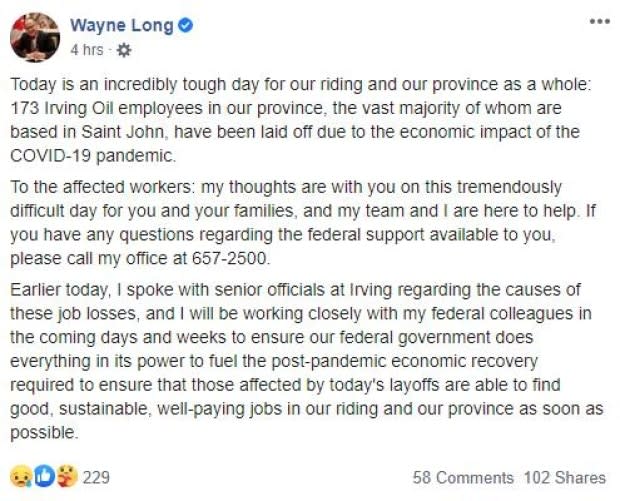Irving Oil blames pandemic for decision to cut 250 employees
Irving Oil is cutting 250 people from its workforce in Canada, the United States, Ireland and the United Kingdom.
That amounts to six per cent of its 4,100 employees.
In a joint statement issued Wednesday, president Ian Whitcomb and executive vice-president Sarah Irving pointed to the COVID-19 pandemic. "The challenges that we face in our business and our industry are unlike any we have ever experienced," the statement said.
"Like many other organizations, we hoped to avoid this outcome as we worked hard to keep our business secure through the extreme challenges presented by the COVID-19 pandemic. This is the last decision we wanted to make and to all those impacted, we are sorry." Irving Oil did not respond to a request from CBC News for further information.
But Wayne Long, the MP for Saint John-Rothesay, said the workers who lost jobs include 173 based in New Brunswick.
"Most of those in Saint John," tweeted Long, who said he talked to senior company officials about the job cuts.
Irving Oil's corporate headquarters are in Saint John, where the company also operates Canada's largest oil refinery.
The company also owns Ireland's only oil refinery, in Whitegate, along with about 900 retail filling stations in Canada and New England. In may, Irving said it plans to reopen the Come by Chance oil refinery in eastern Newfoundland after it acquires the compnay that owns it.
'No one wants to see layoffs'
In Fredericton, Premier Blaine Higgs said he was disappointed with the job losses, but because of COVID-19, market demands have changed. He pointed to the airline industry as an example.
"My understanding is the refinery will continue to run," said Higgs, who spent much of his working life at Irving Oil. "Let's hope this is an interim measure."
He said the Department of Post Secondary Training and Labour will work with people affected by the cuts.
Saint John Mayor Don Darling spoke with Whitcomb and with Jeff Matthews, Irving Oil's chief financial officer on Wednesday. "COVID-19 had global impacts and we're not immune," Darling said in a statement. "While no one wants to see layoffs, it is important for organizations of all sizes, to keep their sustainability intact. We must take every opportunity to be working as a region on economic, social and cultural recovery." Transportation accounts for about 60 per cent of oil consumption worldwide. The International Energy Agency reports oil demand in 2020 is expected to fall by 8.1 million barrels per day, the largest drop in history, before recovering by 5.7 million barrels a day in 2021.
It's not a happy story by any stretch. - Doug Matthews, energy analyst
Jet fuel and kerosene consumption are not forecast to recover "until at least 2022."In late March, Irving's refinery released as many as 500 contract workers, many of them tradesmen, to allow physical distancing.
David Stephen, president of the International Brotherhood of Electrical Workers, said many of those contractors are now returning. He said about 75 per cent of his members were now back at the refinery, and he expects the remaining 25 per cent to return soon.

Calgary-based energy analyst Doug Matthews expects it will take the industry a long time to recover from the drop in demand for petroleum products.
"We're going through a worldwide energy transition," said Matthews. "This may be just a precursor to what is to come."
2nd economic blow in a week
Matthews said barring a significant geopolitical event that disrupts supply he would be happy to see employment levels to return to normal until the end of 2021.
"It's not a happy story by any stretch."
As New Brunswick pushes to get its economy moving again after the COVID-19 shutdown, the Irving Oil job losses are the second big blow in less than a week.
On Friday, in Moncton, cannabis producer Organigram Inc. said it was cutting 220 people from its workforce.

